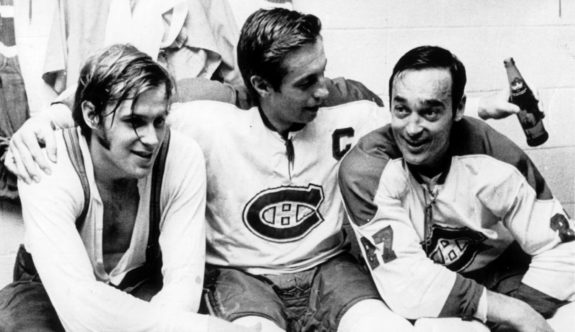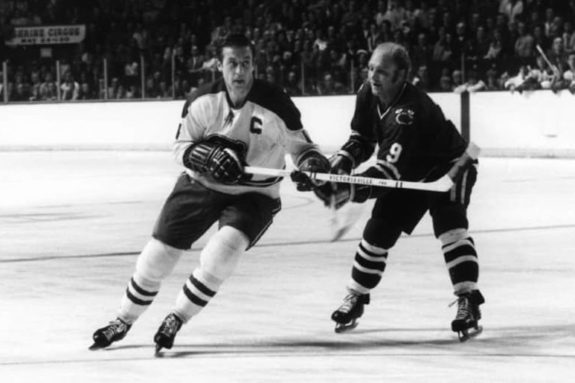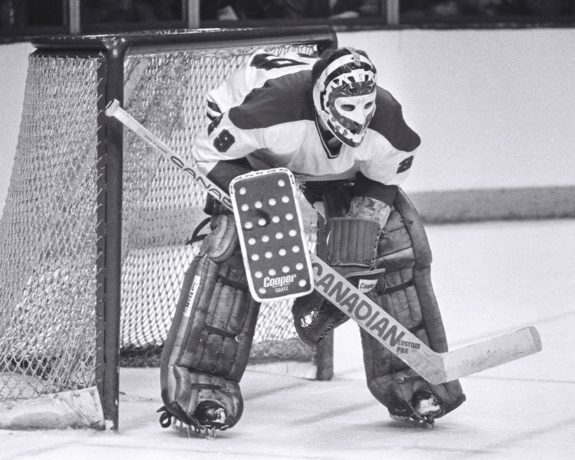As the 1960s gave way to the 1970s, the Montréal Canadiens found themselves lagging behind their forever rivals, the Boston Bruins. At the start of the 1970-71 season, The Beantowners were fresh off their fourth Stanley Cup championship and possessed the most dominant offence in the NHL. League MVP and Bruins legend Bobby Orr scored arguably the most famous goal in hockey history, flying through the air after potting the overtime winner against the St. Louis Blues the previous season.

The Canadiens, meanwhile, were toiling in comparative obscurity, as 1969-70 saw them finish in fifth place in the East Division and miss the playoffs for the first time in 22 years. Despite a 27-goal, 63-point season from leading scorer Yvan Cournoyer, the Habs nevertheless fell behind the rest of the pack. After a season to forget, Les Glorieux awakened something special the next season, with help from an aging icon and a relative unknown.
Gentleman Jean’s Last Hurrah
Entering the 1970-71 campaign, it was already well-known that captain and franchise legend Jean Béliveau would be playing his last season. Béliveau once again was among the Canadiens’ top point-getters, netting 25 goals and 51 assists for a total of 76 points in 70 games. On Feb. 11, “Gentleman Jean” scored his 500th career goal in a hat trick performance against the Minnesota North Stars. He would finish that season on 507 career goals and 712 assists for 1219 points, up to that point the Canadiens’ all-time leading scorer.

In the 1971 playoffs, he finished third among all players in scoring with 22 points and led the playoffs in assists with 16 in 27 games. In the first round against the Bruins, Béliveau almost single-handedly brought Le Canadien back from the dead. Facing elimination in the series as well as down 5-1 in the third period of Game 2, Le Gros Bil scored twice to pull Montréal within a goal and added an assist on Frank Mahovlich’s winner to seal it. Canadiens 7, Bruins 5.
His performance not only helped propel the Canadiens to victory in Game 2 but served as a spark for the rest of the series, which saw the Habs come all the way back to eliminate the powerhouse Bruins in seven games. Béliveau also played a big part in helping the Canadiens past the North Stars, as Montréal eventually defeated the Chicago Blackhawks to win their 17th Stanley Cup.
The Rookie of All Rookies
While one Canadiens legend found himself on the way out in 1970-71, another was freshly minted and on his way to becoming one of the greatest players in franchise history. Rookie goaltender Ken Dryden made his debut against the Buffalo Sabres on March 20th in place of an injured Rogie Vachon. Dryden promptly established himself as one of the best and most feared netminders in the league, as the Habs won each of his first six starts. His play to end the regular season was one of the biggest factors in coach Al MacNeil’s decision to start him over Vachon against the likes of Phil Esposito, Bobby Orr, and Johnny Bucyk.

The Bruins were clear favourites entering that first-round series, having finished the regular season with 121 points to the Canadiens’ 97. It’s fair to say in every individual player comparison, the edge would’ve gone to the Bruins; Esposito over Cournoyer, Orr over Serge Savard, Cheevers over Dryden. These comparisons would quickly turn out to be incorrect, as Dryden dominated the Bruins through seven games, limiting Esposito, the league’s top scorer who potted 76 goals in 78 games, to a meager three goals in seven games.
Dryden’s performances versus Boston continued against both Minnesota and Chicago, and he received the Conn Smythe Trophy as playoff MVP. Dryden would go on to become the most decorated and dominant goaltender of the 1970s, as he backstopped the Canadiens to six more Stanley Cups before retiring in 1979.
A Flower Blooms
The Canadiens’ 1971 renaissance wasn’t complete with the Stanley Cup championship, either. Entering the 1971 Draft, the Canadiens also held the first overall pick. To get it, Canadiens general manager Sam Pollock pulled off one of the greatest coups in league history. The first overall pick in that draft was either going to be Marcel Dionne or Guy Lafleur. Both players were Québécois, and it could easily be said that both players could carry a franchise, as they both did.
Pollock placed a large gamble by dealing the Canadiens’ first-round selection in 1970 and minor leaguer Ernie Hicke to the California Golden Seals in exchange for the Seals’ 1971 first-round pick. By making the move, Pollock was putting all his eggs in the same basket, namely, betting that the expansion Seals would finish bottom of the league.

The 1970 season began just as Pollock wanted, with California wallowing at the bottom of the standings. However, the Los Angeles Kings went on a slide of their own, and soon it was the Kings who found themselves in last place. Pollock sprang into action, trading 1959 Calder Trophy winner Ralph Backstrom to Los Angeles in exchange for Ray Fortin, Gary Labossiere, and a 1972 2nd rounder. The Kings improved and finished the 1970 season in fifth place, while the Golden Seals finished bottom of the league, 10 points behind the Detroit Red Wings. Pollock had his pick. (from “Best trades in Canadiens history: Shrewd moves led to Lafleur’s arrival” Pat Hickey. Montréal Gazette. 12/12/2020)
He used it to select Lafleur, who would go on to define the Canadiens in the 1970s and early 1980s. He would lead Montréal to five Stanley Cups, win the Conn Smythe Trophy, the Hart Trophy as league MVP, and the Art Ross Trophy three times as the league’s top scorer. “Le Démon Blond” carried the Canadiens and became one of the most popular players in franchise history.
You may also like:
- Canadiens Have the Prospects to Finish the Rebuild Internally
- Canadiens Week Ahead: Schedule & Storylines – Laine, Xhekaj, Hutson, Caufield and More
- Montreal Canadiens Must Choose a Direction in Goal
- Maurice “Rocket” Richard: More than Just a Game
- NHL Rumours: Thomas to Mammoth, Henrique Staying & Kings Forward Hunting
As the Canadiens entered the first season of the 1970s, it seemed as if the franchise was in transition as they were no longer the force they had been in prior years. Béliveau’s swan song, Dryden’s dominance, and Pollock’s smooth and savvy dealings re-defined the franchise, and they experienced a rebirth that saw them return to form and retake their place as the NHL’s most elite club.
